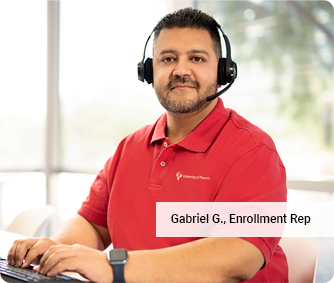
Online Master's in Special Education
Master of Arts in Education/Special Education
Exceptional students need teachers with extraordinary skills. If you’ve earned a bachelor’s degree in another discipline and have been thinking of making a positive impact on students with learning disabilities, start your Master of Arts in Education/Special Education. The curriculum is aligned with the Council for Exceptional Children (CEC) and ISTE standards, and helps cultivate strategies for teaching students with disabilities and collaborating to create individualized learning plans.
Ignite Your Passion
Start when you're ready
Register by:
Courses
Browse courses for your online education degree
Education should hold practical value. That’s why our courses meet rigorous academic standards and provide you with skills and knowledge immediately applicable to your career.
Program Handbook: Teacher Education Handbook
Look for this icon to see which skills you’ll learn in a course.
Oops!
We're sorry, but this program isn't available in your location. See what other programs are available at your location.
Requirements: 46 credits
You’ll need 46 credits to complete this Master of Arts in Education/Special Education. Your course schedule may vary based on previous experience, training or transferable credits.
Schedule
Your academic counselor will help you schedule your classes.
Plus, you’ll find support from our dedicated education program specialists who work with you 1:1 during your 100 required hours of clinical experience (or more if required by your state) and a minimum of 12 weeks of clinical practice (or more if required by your state). Our education program specialists also help you navigate your state licensure requirements for teacher certification, and can help with questions along the way.
COE Central
College of Education students will find many helpful resources on COE Central. Program handbooks provide a wealth of information on topics such as professional expectations, clinical experiences, clinical practice, internships, edTPA and much more. Milestone roadmaps, technology and multimedia resources, and various toolkits are also available.
Program Purpose Statement
The Master of Arts in Education/Special Education is a graduate degree program intended to prepare students with no prior teaching experience for initial teacher licensure. The program is designed for students who want to become special education teachers. Candidates for this program already have a bachelor’s degree. There may be additional qualifications and/or disqualifications applicable in order to work as a teacher with any local, state or federal entity. Requirements for licensure vary by state. View your state’s teacher licensure requirements.
Earn career-relevant skills in weeks – not years.
Learning shouldn’t take years to put into practice. That’s why we’re empowering you to build career-relevant skills with every five- to six-week course.
We’ve worked with the labor market researcher Lightcast to identify in-demand skills for occupations and mapped those to our related associate, bachelor’s and master’s degree programs.
Tuition
Paying for school
Tuition is based on number of credit hours per course. Courses are typically 3 credits, but can range from 1-6 credits. Costs do not include savings opportunities like transfer credits and scholarships.
What affects the overall cost of my program?
Your full program cost can vary by:
- Savings opportunities. Get your degree faster and for less with eligible transfer credits, scholarships and work experience credits. Students with eligible credits and relevant experience can save up to $6,800 and 9 credits off their master’s degree.
With our Tuition Guarantee, you pay one flat, affordable rate from the moment you enroll to the day you graduate from your program.
Earn your master’s degree faster and for less with eligible savings opportunities:
Other ways to save on time and tuition
Because we believe everyone deserves an affordable education, we work hard to help our students achieve one. Here’s a few ways you can save time, save money and avoid starting from scratch.
Transfer credits
Your prior eligible college credits can lower your cost and help you graduate sooner. As a transfer-friendly university, we accept eligible credits from 5,000+ accredited institutions.
Employer tuition benefits
Are you employed? Check to see if your employer has an alliance agreement with us for education benefits. This can help you save money while gaining skills that could apply to your job.
Credit for life experience
We look at all your relevant experience, from parenting to past jobs, to help you get the college credits you deserve. For every 3 credits earned, shave 6 weeks off your degree.
- View 1
- View 2

Budget & borrow
How to pay for college
Paying for school can be intimidating, but we’re here to help you make sense of it. Our finance advisors can walk you through your options like federal financial aid and savings opportunities to minimize your debt. Plus, we can help you figure out your financial plan.
Careers & Outcomes
What can you do with a Master of Arts in Education/Special Education?
Discover where your degree might take you and make informed choices about your future.
A MAEd/SPE can prepare you to be a:
- Special education teacher
- Intervention specialist
- Resource teacher
- Learning support teacher
- Special education inclusion teacher
Top skills learned in this program:
Curriculum development
Professionalism
Special education
Differentiated instruction
Innovation

Ready to get started?
Start your application for free or request additional information.
What you’ll learn
When you earn your online Master of Arts in Education/Special Education, you’ll be equipped with a concrete set of skills you can apply on the job. You’ll learn how to:
- Design and implement effective instruction in the P-12 classroom to produce a positive impact on student learning.
- Evaluate effective professional practice in special education.
- Apply professional ethics to their instructional practices in special education.
- Create and modify instructional and behavioral plans for a variety of learning needs.
- Create innovative strategies and incorporate technology in a P-12 classroom setting.
0% Growth
According to the Bureau of Labor Statistics , it is projected that there is no expected job growth for special education teachers between 2023 and 2033.
The BLS Projected Growth for 2023-2033 is published by the US Bureau of Labor Statistics. This data reflects the BLS’ projections of national (not local) conditions. These data points are not specific to University of Phoenix students or graduates.
Admissions
Apply for free – no application fee, no obligation.
Starting your degree is a big decision — and we want you to feel great about it. That’s why we remove obstacles from your application.
- No cost to request prior transcripts
- No GMAT
- No essay required
How to enroll at University of Phoenix
Receive 1-on-1 support
You have a support team of real people you can lean on. And our academic counselors, who are with you every step of the way, have earned a 5-star rating from 90% of our surveyed students.[1] Start a conversation with an enrollment representative today.
[1] Transactional Survey, August 2021-22 (18,645 respondents)

Call or chat with us 7 days a week.

Gabriel G., Enrollment Rep
Receive 1-on-1 support
You have a support team of real people you can lean on. And our academic counselors, who are with you every step of the way, have earned a 5-star rating from 85% of our surveyed students.[1]
[1] Transactional Survey, September 2022-August 2023 (23,739 respondents)
Start a conversation with an enrollment representative today.
Call us at 844-937-8679 or chat with us 7 days a week.
Student Experience
An education that fits your busy life
Balancing family, work and school
Work toward your degree without giving up what matters most. Start your degree year-round and take one class at a time.
Online learning
Enroll in online classes and attend class whenever it fits your life, day or night.
Around-the-clock support and resources
You have a support team available up to 14 hours a day, 5 days a week.
Computer requirements for courses
Many course assignments will require you to use a computer to complete and submit your assignment.

Faculty Spotlight
Professionals dedicated to you
Your success is a top priority for our deans and faculty members. They bring an average of 28+ years of experience and hands-on perspective to the classroom, and help bridge the gap between academics and industry knowledge.
Accreditation
Accredited for 45+ years
Since 1978, University of Phoenix has maintained institutional accreditation by the Higher Learning Commission (HLC), hlcommission.org . Learn more about the value of University of Phoenix accreditation and how it benefits our students.
The following program educationally prepares students to apply for initial teacher certification in select states:
Master of Arts in Education/Special Education (MAED/SPE).
Educator/Principal licensure requirements vary by state. Candidates located in a state that does not provide a direct path to licensure will be required to obtain Arizona certification first, prior to seeking licensure in their home state as an out-of-state prepared teacher/principal candidate. Arizona certification requires candidates to pass all Arizona-specific licensure requirements, including any Arizona-specific exams (or home state equivalents if recognized by Arizona Department of Education.) After obtaining an Arizona teacher/principal certificate, candidates can then apply for licensure in their home state and may be required to complete additional testing and/or requirements at additional cost. Program requirements may change based upon your home state’s agency licensure requirements. Please visit the teacher licensure page or the principal licensure page for state specific requirements prior to reaching out to your state agency.
While widely available, not all programs are available to residents of all states. Please check with a University Enrollment Representative.





